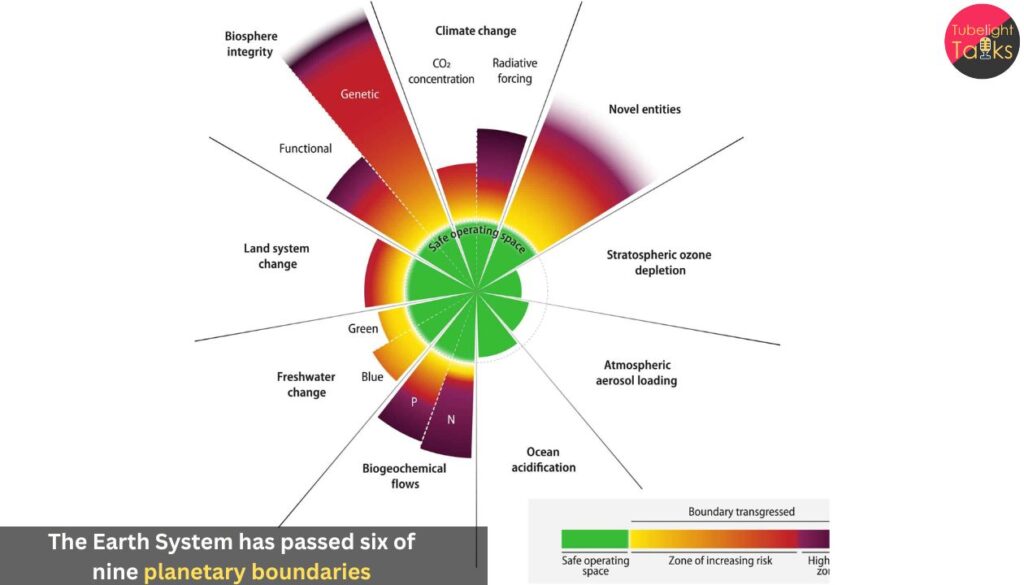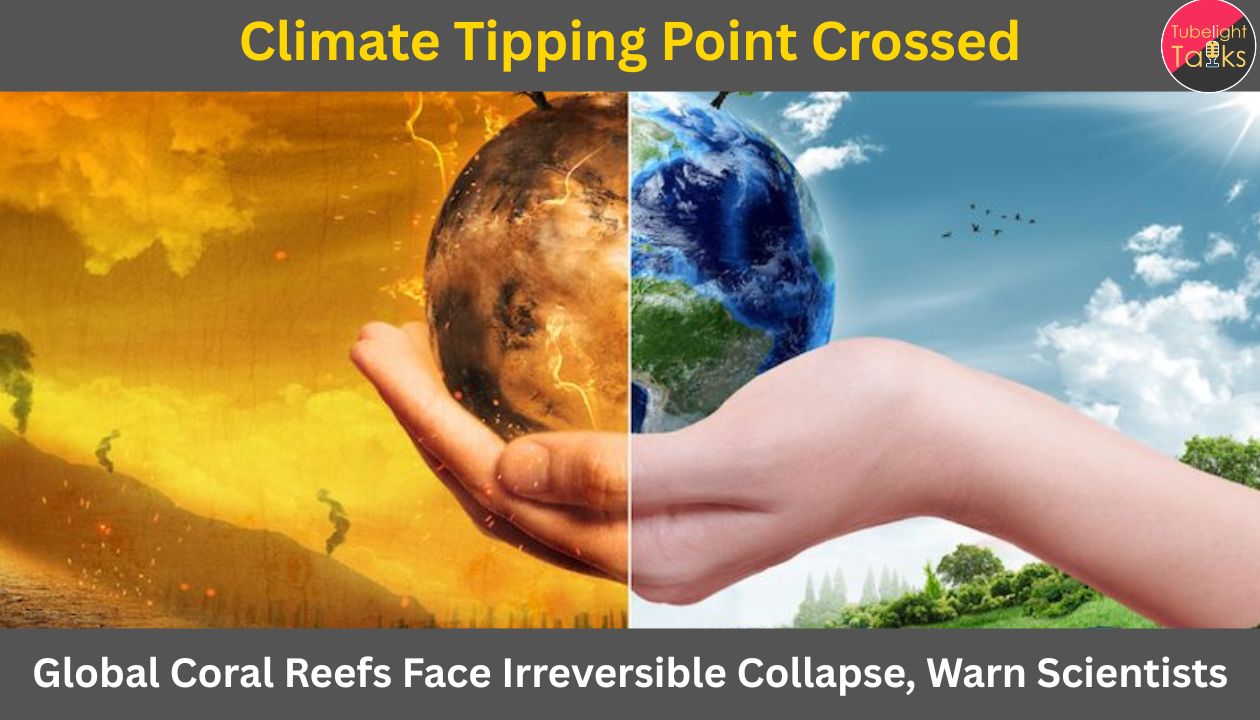Climate Tipping Point Crossed: Global Coral Reefs Face Irreversible Collapse, Warn Scientists
A quiet catastrophe is unfolding beneath the ocean’s surface—one that could reshape Earth’s ecosystems and humanity’s future. According to a new study published by the University of Exeter in October 2025, the world has crossed its first major climate tipping point: the widespread collapse of coral reef systems globally. This marks a profound moment in climate science. For years, warnings about tipping points—thresholds beyond which changes become self-perpetuating and irreversible—have loomed over climate policy. But now, scientists are no longer speaking in hypotheticals. The collapse of coral reefs is real, unfolding, and largely irreversible within human timescales.
The implications stretch far beyond the ocean floor. Coral reefs support 25% of all marine species, protect coastlines from storms, sustain fishing economies, and store vast carbon reserves. Their collapse is not just an ecological tragedy—it signals a cascading failure of Earth’s life-support systems.
What the New Study Reveals
The University of Exeter’s research, led by Dr. Charlie Veron and published in Nature Climate Science, analyzed more than four decades of reef system data across the Indo-Pacific, Caribbean, and Atlantic.
Their key findings:
- Over 70% of the world’s coral reefs now show signs of irreversible bleaching and ecosystem decline.
- Recovery rates have plummeted—reefs that once bounced back in 10–15 years now show no recovery even after 25 years.
- Ocean temperatures have consistently breached 1.5°C above pre-industrial levels in reef zones—considered the “point of no return” for coral systems.
- Acidification and deoxygenation are making waters inhospitable even for robust coral species.
Dr. Veron warned,
“We are witnessing not a gradual decline, but a structural collapse of reef ecosystems on a planetary scale. This is the first tipping point, and it won’t be the last.”
Why Coral Reefs Matter
Coral reefs occupy just 0.1% of the ocean floor—but support an estimated one quarter of all marine life. They serve as nurseries for fish, feeding grounds for predators, and buffers against erosion and tidal surges. More than 500 million people globally depend on reefs for food, tourism, and coastal protection. In monetary terms, reefs contribute over $375 billion annually to the global economy.
Their destruction has ripple effects:
- Collapse of fish populations, leading to food insecurity
- Increased vulnerability to cyclones and sea-level rise
- Loss of tourism and coastal economies
- Disruption of global biodiversity balance
Climate Change: The Driving Force
The primary cause of reef collapse is climate change, driven by human-induced greenhouse gas emissions. When ocean temperatures rise even slightly, corals expel the symbiotic algae (zooxanthellae) that give them color and nutrients—a phenomenon called coral bleaching. While bleached corals are not immediately dead, prolonged exposure leads to starvation and death.
Here are the key stressors:
- Warming oceans from global heating
- Ocean acidification from CO₂ absorption, which erodes coral skeletons
- Nutrient pollution from agriculture and sewage runoff
- Overfishing, which disrupts reef species balance
- Plastic waste, which smothers coral surfaces and carries pathogens
In combination, these create what scientists call a “death spiral” for reefs.
Geographic Impact: Where the Collapse Is Most Severe

The worst impacts have been recorded in:
- The Great Barrier Reef (Australia): Over 90% bleaching in recent surveys; recovery nearly halted.
- Coral Triangle (Indonesia, Philippines, Malaysia): High biodiversity zones now under acute stress.
- Caribbean Reefs: Coral cover has declined by more than 80% in the past three decades.
- Florida Keys and Gulf of Mexico: Acidification and disease outbreaks have devastated reefs.
Even the most remote, protected marine parks are not immune.
A Warning for What’s Next
Coral collapse is the first domino—scientists warn that other climate tipping points may follow:
- Greenland Ice Sheet melt
- Amazon rainforest dieback
- Permafrost thaw releasing methane
- Atlantic Meridional Overturning Circulation slowdown
Each of these, once triggered, becomes self-sustaining and accelerates global climate disruption. Coral reef loss may thus mark the beginning of an era of irreversible Earth system changes.
Can Coral Reefs Be Saved?
The answer, according to the study, is grim but not hopeless. Coral restoration projects, like artificial reef building and lab-grown coral seeding, have shown promise—but only at very small scales. Marine Protected Areas (MPAs) and stricter fishing laws help, but cannot stop ocean warming. The only effective large-scale solution is to radically cut global carbon emissions to keep temperatures below 1.5°C.
As Dr. Veron notes:
“We are no longer racing to save the reefs—we are racing to stop the rest of the biosphere from following.”
Technological Solutions and Their Limits
Some researchers advocate geoengineering—cooling oceans through cloud seeding or creating reflective marine surfaces. Others propose mass coral gene editing to produce heat-tolerant strains. But critics warn that these are untested, risky, and may produce unintended ecological side effects. The scientific consensus remains firm: Prevention through emissions cuts is safer and more ethical than emergency interventions.
Voices from the Frontlines
Coastal communities are already feeling the impact. In Fiji, tourism workers report reef dives reduced by half as colors vanish. In the Maldives, fishers have seen key species vanish in less than a decade. In Belize, rising sea levels now flood coastal towns that were once protected by coral barriers.
One Maldivian fisherman said:
“When the corals were alive, the ocean was alive. Now the ocean is quiet—and empty.”
Environmental Collapse and the Need for Satkarm
The rapid breakdown of Earth’s ecosystems raises profound spiritual questions. According to Sant Rampal Ji Maharaj, true dharma is not ritual, but right action (satkarm) guided by truth and compassion. When humanity acts out of greed, denial, and neglect, it violates not only ecological balance but the moral order of the universe. Nature, in its wisdom, gives many warnings before collapse. Ignoring them leads to irreversible loss—just as we now see with coral reefs.
The scriptures teach that Earth is not a possession, but a sacred trust. Restoration, then, must begin with inner transformation—a shift in values from exploitation to stewardship. The current crisis is not only a call for climate action—but for spiritual awakening rooted in truth, simplicity, and universal service.
What Governments Must Do
- Strengthen Climate Commitments: Align with 1.5°C targets under the Paris Agreement
- End Fossil Fuel Subsidies: Redirect funds to renewable energy transitions
- Expand Ocean Protection: Enforce large-scale Marine Protected Areas
- Invest in Coastal Resilience: Build sustainable infrastructure for vulnerable communities
- Support Climate Finance: Help developing nations adapt and mitigate through climate funds
Without coordinated global action, the reef crisis may soon repeat itself across rainforests, ice caps, and farmlands.
Business and Industry: A Role to Play
- Cut emissions in operations and supply chains
- Shift investment toward sustainable technologies
- Protect ocean and coastal zones in ESG strategies
- Support science and climate restoration through public-private partnerships
Companies can no longer ignore ecological limits. Sustainability is not charity—it’s survival strategy.
Final Reflection: A Tipping Point for Humanity
The collapse of coral reefs is not just an ecological loss—it is a mirror held up to humanity. It shows us the cost of short-term thinking, the arrogance of control, and the urgency of change. We now stand at a greater tipping point—not just for climate, but for civilization itself. Will we act boldly to protect the living planet? Or watch in silence as each ecosystem quietly dies? One tipping point has passed. Let it be a wake-up call, not a death knell.
Read Also: Record CO₂ rise intensifies fears of looming climate tipping points
FAQs: Global Coral Reef Collapse and Climate Tipping Point
Q1: What is a climate tipping point?
A tipping point is a critical threshold beyond which a system undergoes irreversible and self-perpetuating change.
Q2: Why are coral reefs considered the first crossed tipping point?
Because their decline has passed recovery thresholds due to sustained warming, acidification, and ecosystem degradation.
Q3: How much of the world’s coral reefs are collapsing?
Over 70% show irreversible damage or bleaching with no signs of natural recovery, according to the latest study.
Q4: Can coral reefs be restored?
Small-scale restoration is possible, but full recovery requires global emission cuts to stop ocean warming.
Q5: How does coral reef collapse affect humans?
It impacts food supply, coastal protection, marine biodiversity, and global carbon cycles—affecting millions of lives.
Q6: Is geoengineering a solution?
Some technologies are being tested, but most are risky and unproven at scale. Emissions reduction is safer and more effective.
Q7: What should be done now?
Urgent global action to reduce greenhouse gases, protect oceans, support restoration, and align policy with climate science.











Discussion (0)